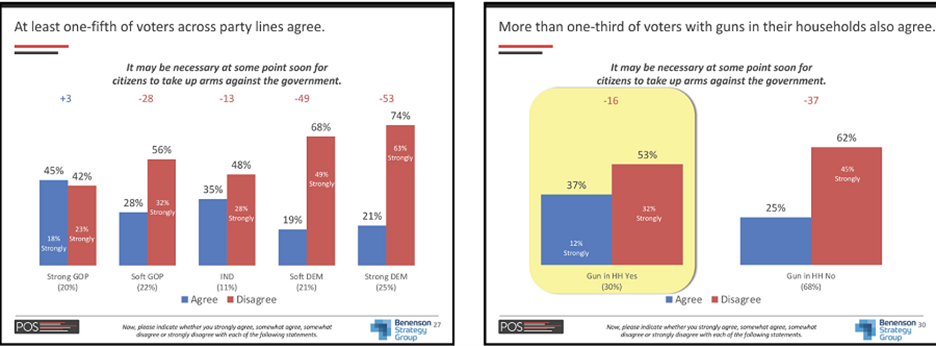DEMOCRATS ARE SERIOUSLY ILL AS BIDEN
 33% of GOP/35% Indie voters: may have to take up arms against gov’t
33% of GOP/35% Indie voters: may have to take up arms against gov’t
It was a godsend moment for Democrats: Joe Biden announced he has cancer (7/20).
He’s not at risk of dying from cancer, because you generally can’t die from a disease you don’t have. But Biden’s shambling mind has reached the state where he can’t even keep track of which disease he’s pretending to have.
Usually, when he tells the story about growing up in Pennsylvania, and he’s lying about how polluted the state is and describing driving around with “oil slicks” on the windshield of his car, he claims he and everyone he knows has asthma.
But this time when Biden told the story, he accidentally gave himself cancer instead of asthma, which certainly drives home the point more effectively. It drives home a lot of points more effectively.
The Democrats are in the same trouble they get into every time they’re running the country: People hate their policies so much that the only recourse is to pretend they’re not actually in charge.
Look at Representative Alexandra Ocasio-Cortez (D-N.Y.), attending a protest so she can pretend to get arrested—as though she were a child in high school (a ritzy high school where the kids don’t have to worry about finding jobs).
From some angles, it’s pathetically funny: See the Democrats protesting against themselves, against the injustice of the government they control, against the misery brought about by their own legislation, against the cruel fate that threatens to hold them responsible for what they’ve done.
There’s a reason that all leftist policy is about transferring responsibility from individuals to groups.
Biden may be the least popular president in history—but that’s good for Democrats. Just as it’s good that he thinks he has cancer (or asthma or whatever).
If the Democrats can force him not to run for a second term, they can make him the scapegoat for all the suffering wrought intentionally by the leftist agenda. It gives them a clean slate. As long as America is willing to buy it.
I don’t mean, of course, that America might be willing to buy into wrapping this trainwreck around Biden’s neck. They have known from the start, even Biden’s voters have known, that he was never really in charge. They knew that other people were standing in the shadows and pulling the strings.
Some Democrats voted for a third term of Barack Obama. Some Democrats voted for a first term of Obama consigliere Susan Rice, et al. But no one, or almost no one, really voted for Biden, who, remember, largely ran his campaign from his basement.
Americans have to be willing to buy into the theoretical possibility that Democrats could win the next election. They know it’s vanishingly unlikely that a majority of the voters in the country would choose the Democrats. It’s even less likely now than it was in 2020.
But the question from Democrats’ perspective is not whether they can win, but whether America will accept being told that Democrats have won.
When America wakes up again, after going to sleep election night with Republicans in the lead across the nation, and they’re presented with another “red mirage”—with the result of millions and millions of votes magically appearing at 4 o’clock in the morning in all the most crucial districts—will they accept it?
Will they be willing to suspend disbelief, as voters in New York City and Chicago and San Francisco already do, when they are told that despite the disastrous tenure of the Democrats in office, the voters have decided to extend that tenure?
The Democrats can’t hope to win. They can only hope that getting rid of Biden will make a win seem plausible. They can only hope that, when they cheat, Americans will let them get away with it rather than coming after them with pitchforks.
That hope may be fading. See graphs and story above.
Dan Gelernter is the CEO and Founder of the technology startup Dittach. He writes on technology regulation, business
policies, computer science, art, foreign policy, and military history.

